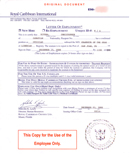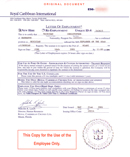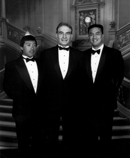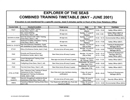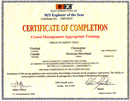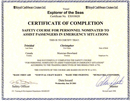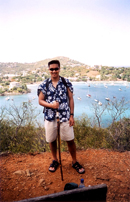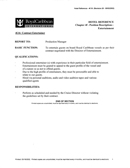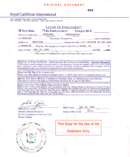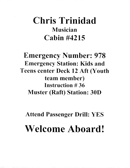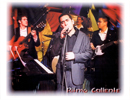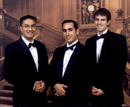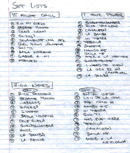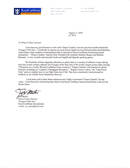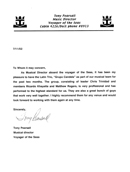>> write // blaaaags and reflections // life aboard ship
The First Gig: Grandeur of the Seas: Winter 2000: Southern Caribbean
Taking the Call
Short Term Passengers
The Second Gig: The Explorer of the Seas: Summer 2001: Eastern Caribbean
Going Through Security
Seeing The Explorer
An Annotated Guide to the Explorer of the Seas
Information Overload
Save the Waves
Hierarchy, Smiling, and More Training
The (de)vices of Time and Work
Musical Director: Gone
Personal Survival: Watertight Doors
Personal Survival: Abandon Ship!
Settling In and Making Cash
Visiting The Ports I: Labadee, Hispaniola, or Haiti?
Making (Background) Music
The Third Gig: The Voyager of the Seas: Summer 2002: Western Caribbean
Ritmo Caliente or Grupo Candela?
Taking Your Culture and Selling It Back To You
Time (re)dux
Visiting the Ports II: Shore Excursions
Wave(cool)running(s)
New People
Room Service
Cabin Stewards and the Ethics of Proper Pay
A Call to the Cruise Director's Office I
GOLD Anchor Standards
A Call to the Cruise Director's Office II
The Way Out
Postscript: Continuing to Cruise
The First Gig: Grandeur of the Seas: Winter 2000: Southern Caribbean
I took the cell phone call just outside of the foyer of the Fir building where most of the Capilano College music students would congregate after a class or after a particularly long ‘shedding’ session of individual practice or ensemble rehearsal. I had come back from playing a gig in Whistler some two hours away just the weekend before. It was Monday and I was still a little groggy from driving back at 3 AM on Sunday morning through snowy and almost white-out conditions. The gig didn’t pay enough to merit staying the night, so the sax player in the band and I braved the weather back to Vancouver. Before we left Whistler, Marlin the bandleader, asked me if I was interested in a two-week cruise ship gig down in the Caribbean over the Christmas break. My excitement at the prospect of Caribbean sun reengaged my foggy mind as the cell phone call confirmed the gig.
Taking the Call
"Of course!" I exclaimed.
"It leaves in a week?"
"Who’ll I be playing with?"
This was December of 2000, I was barely 21 years old, and still living at home. Taking the gig meant spending my first Christmas and New Year without my family. But, it was an opportunity to see a part of the world and to see if what I was learning in music school could pay off. It was an opportunity to earn some cash and for many this would be considered a vacation. I was certainly looking at the gig in this way and with my family’s blessing, I signed on to the adventure.
The entertainment division of Royal Caribbean Cruise Lines (RCCL) was looking for a short-term substitute for a Latin band due for a short vacation home. I was learning the craft of playing bass tumbaos and other Afro-Caribbean grooves, and so I thought this practical experience would add to my fledgling knowledge of this music. [*]
After going through the prerequisite medical exams and after a very brief rehearsal to determine our repertoire, we were declared fit and ready. Marlin was not with us as she and her husband Fito were fulfilling another short term contract on a neighboring ship also sailing in the Caribbean. Her brother Elio, a percussionist, whom I knew from the Whistler gig, would be joining us as bandleader and a guitarist, Budge, whom I knew from my days with Ache Brasil was also on the gig. The person I did not know personally was our singer Rosie.
I was scheduled to fly out with Rosie. Budge and Elio took a different flight. We were slated to meet in San Juan, Puerto Rico to board our ship the Grandeur of the Seas. Our seven-day itinerary included the Port of San Juan, the island of Saint Thomas (of the US Virgin Islands), and the islands of Sint Maarten, Aruba, and Curaçao (which collectively comprise part of the former Netherlands Antilles and now the Kingdom of the Netherlands). This was a one week itinerary, and so we had the opportunity to enjoy the Southern Caribbean sun for two such voyages. [*]
Short Term Passengers
As a bonus, because we were short term passengers, we were given passenger staterooms (cabin 2638, in fact) with full passenger privileges. This meant that we were free to roam all passenger areas (along with the regular crew areas) of the ship and enjoy all of the amenities provided to regular paying passengers. For me, it was indeed like a vacation. I was getting paid to play music, I was being treated very well with nice accommodations and unlimited food, and I had the opportunity to travel. What more could I ask for? [*]
We played in all sorts of venues around the ship: beside the pool, in the Centrum of the ship, and in various bars and dance lounges. We met musicians from all over the world. Before packing up and concluding our adventure, I made sure to buy for my family back home the requisite T-shirt and magnet souvenirs being sold on each island. [*]
Those two weeks felt like the longest two weeks of my life. I am not sure if it was because I was away from home and my family during this festive time of the year, or because I was in a surreal place at age 21 and on my own. In any event, at the conclusion of that stint, I came back to Vancouver looking forward to the next cruise gig opportunity. [*]
The Second Gig: The Explorer of the Seas: Summer 2001: Eastern Caribbean
Marlin called again, this time in late spring of 2001, to let me know that another cruise gig opportunity had come up for that summer. Our configuration for this gig was a trio which would comprise myself, Elio, and a local guitar player named Eduardo. The stint would be six weeks long in duration over the course of the summer between June and July. We were to sign on to the Explorer of the Seas with an Eastern Caribbean itinerary that included our home port of Miami, Florida; Nassau, Bahamas; Saint Thomas, US Virgin Islands (again); San Juan, Puerto Rico (again); Labadee, Haiti, and back with a couple of days-at-sea in between for good measure. This time, however, we were given regular staff cabins, guest entertainer privileges, and limited passenger status. [*]
Going Through Security
After a couple of rehearsals to set repertoire, we left Vancouver together and arrived in Miami the night before we were to board. On the way there, we had a stop over in Toronto but our flight was delayed in arriving at Pearson International Airport (YYZ). We almost missed our connection, but I recall speeding through security and customs while the airline gate agents paging us by name over the intercom. Of course, these were the days before September 11, 2001.
Seeing The Explorer
After an evening in Miami, we took a cab to the Port of Miami early the next day. As we pulled up to the pier, there stood this enormous ship. It was quite breathtaking. I had read a little about the ship before we left Vancouver. I knew that, among other amenities, an ice skating rink, a rock climbing wall, a golf simulator, and also an oceanographic laboratory for research lay inside. My grandmother is amazed at how such giant pieces of machine we call airplanes can fly in the sky. My question was: "How can such a giant and heavy piece of metal float in the water?"
Of course, the ship is more than a giant and heavy piece of metal. The engineering principles are beyond me, and I was amazed, like any would-be passenger seeing the ship for the first time. The ship can hold a little over 3,100 passengers and a little under 1,200 crew. With a gross tonnage of about 137,000, it was amongst the largest cruise ships in the world.
Upon passing through the security check point with our luggage, and upon signing on to the Explorer of the Seas we met the crew purser who showed us to our cabin, handed us our room keys, and gave us a brief orientation of the area immediately around our cabin. I was to share cabin 4215 with Elio. Upon sliding the room key into the slot and opening the door, Elio and I quickly found out that this cabin was not anything like the passenger cabin that we had before. [*]
The whole space was approximately 125 square feet. Squeezed in the frame was a bunk bed, a small table with two chairs, a mini television set, clothes drawers and a small wardrobe closet, a fridge, and the infamous bathroom. It really is quite a feat of engineering to fit a toilet, sink, and shower in such a confined space. The running joke then, as it is now, is that you can urinate, brush your teeth, and bathe simultaneously. Just don’t keep the faucet running. Also, there was no porthole in our cabin. I wondered how we’d be able to tell day from night and vice versa if there was no daylight in our cabin.
After a quick unpacking and settling in, we met the musical director of the ship in the crew lounge. Actually, he was subbing for the actual musical director who was on vacation. I only remember his name today as "Jeff the trumpet player."
An Annotated Guide to the Explorer of the Seas
He gave us a copy of our performance schedule and also a copy of the Annotated Guide to the Explorer of the Seas Orchestra, a document that the vacationing musical director had written for the ship orchestra before he ... vacated. He thought that the other music groups on the ship might benefit from his words of advice. I took a quick glance and noted the more pertinent and interesting passages:
On Dress Code: After a definition from Webster’s dictionary, the following acclamation is made: "In other words, I gotta wear it, so you gotta wear it. If you wish to attire yourself with a checkered bowtie and purple socks, then you must buy them for the entire orchestra. ...
Baseball caps, tank tops, and boxer shorts are not permitted in the staff mess, because no one wants to see your armpits or manhood while they’re eating. Well, there are a few guys who do, but most of us would rather skip it."
On Purpose and Scope of Position: "Our goal is simple: make good music and try to have a few laughs. Some of the entertainers we work with and their music are excellent, some are very good, some are good, and, well, occasionally we have to polish a turd. It is always our job to prepare and perform to the best of our abilities regardless of what we may think of a performer and their show. It has nothing to do with Royal Caribbean International, and everything to do with having respect for your fellow musicians who must share the stage with you. If you sound bad, then we sound bad."
On Additional Duties and Responsibilities: "As a crew member on this or any other ship, you have duties that you will perform in the event of an emergency. These duties are simulated once a week during a crew boat drill ... You have two stations, an Emergency station and a Muster station. ...
(At) your emergency station ... it is your duty to line up guests in an orderly fashion in preparation for loading them into the lifeboats in the event that we would have to abandon ship. Since guests don’t participate in crew boat drills, all you actually do is stand there and pick your nose. ...
As well there is a passenger boat drill every Saturday that you must attend."
On A Couple of Other Things (!): "Orchestra members are welcome to spend their breaks and off-duty time in many of the ship’s lounges. ... You may be in any lounge except the Champagne Bar on deck 5 aft and the Connoisseur Club on deck 5, forward. Trust me, they’re out of your price range anyway. ... As a staff member, you are not entitled to be sitting (or standing) at any of the bars. If you tell the Cruise Director or anyone else that you didn’t know, you will be assassinated by the Explorer of the Seas death squad. ... If you’re not sure whether you can or can’t do something, then you can’t. ...
This is not the military, but this is a maritime vessel subject to maritime law. Royal Caribbean International is a multi-billion dollar corporation that employs many thousands of people on these vessels, from dozens of countries, with different cultural and ethnic backgrounds. Personally, I would not want to work on a ship that wasn’t strict about our safety and security. All of these policies are designed to protect everyone’s dignity. ...
... between all the musicians on board, there is a massive amount of collective musical knowledge and experience, so we all have a marvelous opportunity to grow and mature as musicians if we open ourselves to suggestions and constructive criticism. Let’s please avoid the defensive ‘mindset.’ ‘Don’t tell me how to play my instrument’ is a particularly unproductive comment. ...
... It is a privilege and honor to be your Musical Director, and I look forward to working (playing) with you." [*]
Information Overload
There was certainly a lot more information to absorb this time around as it wasn’t the quick two week jaunt that we had embarked on the previous December. But, I looked forward to learning about everything there was to know about living on this floating city. All new sign-ons and new hires were required to abide by the legal requirements of the International Maritime Organization and the Standards of Training, Certification, and Watchkeeping for Seafarers. (It seems strange that vessels registered in Liberia, Panama, or the Bahamas flying flags of convenience would have to abide by certain legal requirements. More on this later.) The Safety Officer of the ship met us in the Crew Disco for our Pre-Departure Safety Training which involved mostly watching an introductory video. [*]
The rest of our training would take place over the next week with various ship officers and would involve understanding Shipboard Safety and Guest Vacation Policies, Ethics Policies and Conduct Standards, Diversity and Personal Survival, Crowd Management Training, Firefighting and First Aid, Zero Tolerance Training on Drugs and Sexual Harassment, and the Save the Waves program.
Save the Waves
This latter program was mostly about informing us newbies of what the company is doing about the environmental impact of the cruising industry upon the natural world. Once more, we were treated to the corporate video. This probably assures that a consistent message is delivered to all those who are graced to hear and see it. The video also bypassed the strong accent of the Environmental Officer, the person charged with the delivery of this training module.
The Save the Waves program was started in 1992 by RCCL. I believe this was in response to the development of a series of standards for monitoring the environmental impact of the cruising industry upon the oceans on which its ships sail. The company names on its website four key principles associated with the Save the Waves program: (1) a commitment to reducing waste, recycling and reusing where possible, and proper disposal of remaining waste; (2) active pollution prevention where nothing is ever tossed overboard; (3) going above and beyond compliance and attempting to exceed standards; (4) a commitment to continual improvement of its practices and procedures.
Of course, it all sounds well and good to clearly articulate a program. And, of course, words are only printed letters on a page until they are enacted upon. It seems entirely reasonable that such large ships carrying over 4,000 people would produce an enormous amount of waste of all sorts and would probably consume at least an equal amount of materials. In practice, it seems that the company had been in trouble for its lack of environmental stewardship in the past.
Cruise Ship Blues by Ross Klein, a researcher who specializes in sociology and social work from Memorial University in Newfoundland and a one-time frequent cruiser, shed some light on the impact of the cruising industry in general, and RCCL in particular. An investigation of the RCCL fleet between 1990 and 1994 found the company dumping "oil-contaminated bilge water overboard." [1] Klein went on further to state "based on (these incidents) and dozens of others investigated in other jurisdictions in the United States, Royal Caribbean International pleaded guilty in July 1999 to 21 felony counts of dumping oil and hazardous chemicals and one count of making a false statement to the US Coast Guard. With plea agreements in Miami, New York City, Los Angeles, Anchorage, Puerto Rico, and the US Virgin Islands, the company agreed to pay an $18 million fine. Its violations included dumping not just oil but also dry-cleaning fluids, photographic chemicals, and solvents from the print shop." [2]
Naturally, none of this was articulated in the video that we saw. Also, at that time, I was not really thinking about the impact that the ship was making on the environment. I merely found it interesting that the company would make it a point to really educate its employees about what it was doing for the environment. Perhaps this was done so that employees could then relay to any inquiring guest what the company was doing to support ocean ecology. The following practices were outlined to us in the video and verbally by the instructor: (1) There are incinerators for onboard burning of garbage, boilers for burning sludge oil, treatment plants for sewage; (2) Aluminum cans are recycled in a special compactor, shoreside containers are used for garbage in some ports, and garbage is separated into four different containers - wet garbage, paper and plastic, glass, and cans; (3) We do not throw anything overboard. One can deduce that there is a lot of burning, that there is still a lot of garbage being produced by the ship; and ... the company does not throw anything overboard, just to be clear!
Hierarchy, Smiling, and More Training
The other training modules were true to their titles. On all of these modules other new hires joined us from all of the other departments on the ship. This made very visible the ethnic and cultural diversity of the officers, staff, and crew.
Incidentally, the designations officers, staff, and crew delineate various responsibility categories. Officers wear striped insignia and generally consist of those who hold supervisory positions for the deck, engine, and hotel departments. Staff include most of everyone who is involved in the various food and beverage divisions, entertainment, and cruise personnel. Crew generally comprise any cabin stewards, waiters, and deck hands. Collectively, all officers, staff, and crew are referred to as crew members. If this all sounds confusing, then what was clear here was that there was an organizational hierarchy and a chain of command onboard the ship with each person reporting to and directly accountable to another person. Every person is subordinate to someone else, except for the Master of the Ship (Ship Captain), who, in effect is like the undisputed king of this floating city! [*]
During the diversity training module, I met people from other parts of the world. Some were from Latin America, others from Eastern Europe, and others still from various parts of Asia. Some were young and in search of adventure (like me), and others were middle aged and supporting families back in their home countries.
Later in the same module, the instructor also shared with us the ship’s policy of acknowledging people as they pass by making eye contact and smiling not only to guests but also any to crew members we might encounter along the I-95. Named after the interstate freeway that runs the length of the east coast of the United States from the state of Maine to the city of Miami, the I-95 on the ship refers to the main passage artery for the ship’s crew members, for any provisions that await storage in various compartments, and, on disembarkation day, storage for guest’s luggage.
While smiling toward and positively acknowledging guests is understandable (and, perhaps, profitable for the company in the long run), I would later understand how crucial smiling toward and positively acknowledging other crew members is absolutely necessary.
The (de)vices of Time and Work
When the musical director gave us a copy of the performance schedule, I noted that we would play about 18 hours a week. We also had a day off in the mix. I later learned that most of the crew (not officers or staff) work anywhere from 8 to 12 hours a day, 7 days a week (read: no days off!). It is no wonder that these ships fly flags of convenience: in this way, they can avoid the more stringent labor laws of the United States!
After work, most of the crew either retired to their cabins or headed to the crew lounge where they were free to socialize with other crew and where alcohol is plentiful and inexpensive. The ingredients for a perfect storm toward depression and alcoholism were there. Take the daily monotony and task repetition of ship life, add long hours with little rest, mix in a lengthy contract and little freedom from following rules and hierarchy, factor time away from family and loved ones, together with the inexpensive availability of alcohol and other lonely people, and you can guess the rest. [*]
Musical Director: Gone
About halfway through this second contract, I had an opportunity to sit and chat for a while with the substitute musical director. It was probably immediately before he had to hand the reins back to the actual musical director. We were sitting in the lounge area of the ice skating rink known as Studio B. We happened to sit across one another and we started talking about music. His body language and lack of eye contact seemed to indicate that he might have been pre-occupied with something which would have been natural given his responsibilities.
"I’m really looking forward to Nassau tomorrow," he said.
"Atlantis is there and I can hit the tables and the slots!"
So, he was looking forward to gambling. Crew members were not allowed to gamble aboard the ship. He took a sip of his scotch.
"Why don’t you save any of your money?"
It was something only a naive 21 year old would ask an older musician. It seemed obvious to me at the time since saving money was part of my goal of working aboard ship. How presumptuous of me to think that was his goal too. In the course of our conversation, he revealed to me that he had not had a fixed address since 1983 and that he had been living and working on ships since his driver’s license had expired at that same time. He spent his earnings in port on alcohol, women, and gambling. His eyes glazed and lost, our chat drew to a close as he polished off his drink and sauntered off his seat and exited Studio B.
So, given the work conditions that many of the crew have to endure so that they can get paid, the least we could do was acknowledge the humanity of those we encounter along the stretch we call the I-95 by ... smiling.
Personal Survival: Watertight Doors
One of our training modules included personal survival. It was during this module that the Safety Officer gave us a tour of the ship. We started along the I-95 which, in my estimation, took about 5 minutes to get from one end to the other. We made our way to the bridge. All of the controls, display monitors, and personnel made me feel like I was on the bridge of USS Enterprise from Star Trek: The Next Generation. There was a formality to the language the officers used as they coordinated their functions and duties.
The captain’s quarters were located in close proximity to the bridge. We did not get a chance to see that room, but we could only imagine how posh it might be. It is a big responsibility, after all, to be the Master of the Ship!
We then made our way down to the depths of the ship below Deck 0, which, in effect, was below the water line. Corridors and cabins intersected like catacombs. White fluorescent tubes provided lighting. Although, again, if you were a cabin steward for the crew members only your watch or your body clock could tell you if it was night or day. Down another bank of stairs and we were at the very bottom of the ship.
The Safety Officer wanted to take us here to show us how the watertight doors worked. Through his walkie-talkie, the Safety Officer signaled the bridge to begin the demonstration of the watertight doors. A loud alarm sounded and the door began to close.
"You don’t want to get any part of your body stuck as the watertight door closes," the Safety Officer shouted over the clang of the alarm.
"Once the bridge initiates the action, and for the safety of the ship, manual local operation of the watertight door does not function."
The alarm stopped and the group was essentially locked in the compartment.
"Once that door closes and you happen to be in the compartment, your next step is to find an alternative escape route. ... Okay? Let’s move on to the fire door demonstration. These ones you can always open manually locally."
Not okay. As the Safety Officer signaled the bridge that we completed the watertight door demonstration, I glanced around for the alternative escape route that he mentioned all too quickly. The answer was obvious: there were no other escape routes. If you happen to be stuck in the watertight compartment ...
Personal Survival: Abandon Ship!
In the (un)likely event that we had to abandon ship, we "would hear 7 short blasts followed by one long blast" from the ship’s whistle. That would be the signal for me to head to my muster station with lifejacket in hand and begin the process of loading passengers onto the lifeboats. While we had very real and important responsibilities to attend to, the Safety Officer had an addendum.
"When you go to your cabin to grab your lifejacket, make sure you grab your cash as well. You’ll need it when you survive."
His assurance of our survival, was, well, reassuring. And, of course, there was no room to pull out any Titanic jokes in these training modules. Although, what would really happen in the event of a major catastrophic emergency? Could any training actually mitigate passenger panic?
The Costa Concordia disaster of early 2012 spelled out quite clearly what could happen. After the master of the ship Francesco Schettino ordered a deviation from the pre-programmed route, the ship hit a reef off the coast of Italy causing the ship to eventually run aground. The response afterwards is still the subject of inquiry as of this writing, but it appears from eyewitness accounts, and amateur video taken onboard by passengers, that some key ship personnel were in complete disarray with no organization as to how to handle the emergency. One particular video shows a staff member assuring passengers that the emergency was merely an electrical failure and that the passengers should return to their cabins. The captain himself abandoned ship before his officers and passengers thus breaking the centuries-old tradition of captains going down with the ship (or, at the very least, captains being the last to abandon ship).
Could something like this have happened on the Explorer? Possibly. I suppose that it is better for the crew to have some training than none at all. At most, this training could very well save lives when disaster strikes. At the very least, the company was assuaging the International Maritime Organization and perhaps complying with some international laws by providing these training modules. The question remains: How does one evaluate whether the training is effective?
Settling In and Making Cash
While the training was taking place, we settled into our roles as guest entertainers. Our weekly schedule was fairly lax: six days of playing an average of three hours a night with one day off. It essentially amounted to an eighteen hour work week. We were paid about $500 US dollars a week which, given the low Canadian dollar exchange rate in 2001, amounted to a decent take-home when combined with the fact that we essentially had no expenses. I had absolutely no desire to waste away any of my earnings on alcohol or gambling.
Elio and I, as roommates, spent most of our free time hanging out and exploring the ship. Our conversations with other musicians revealed the possibility of signing up for part-time jobs in order to make some extra cash.
One such department that had openings for musicians was Shore Excursions. This department was responsible for retailing the land tours that local operators ran while in port. For this department, I did everything from stuff envelopes with tickets, to delivering those tickets to staterooms, to standing behind the Shore Excursion desk and selling the actual tours.
Elio and I also worked for the Sports Desk. In addition to the main attraction rock climbing wall, the ship had a small basketball court, a running track, an virtual golf simulator, a mini-golf course, and an in-line skating track. The Sports Deck was busiest while the ship was at sea. And, for this department, I was an in-line skate dispensary attendant and a rock climbing wall spotter. Hardly fulfilling, and absolutely sweaty work.
From both of these departments we were paid a paltry $8 an hour. Again, it was an opportunity to make a little extra cash on the side. We were paid weekly and when we were in our home port of Miami, the cash went straight toward the purchase of phone cards so that CT could phone home.
Visiting The Ports: Labadee, Hispaniola, or Haiti?
Kristoffer Garin, in his book entitled Devils on the Deep Blue Sea, describes tourism marketing as falling into two categorical models: the Roman Holiday where people travel to see specific attractions and the Disney World model where "an entire environment is remade to conform with a preexisting idea of what people want." [3] The predominant model, according to Garin, is the latter. No where is this more apparent than in the private resorts Coco Cay in the Bahamas and Labadee in Haiti which are two resort areas that RCCL leases from those respective countries.
RCCL has essentially manufactured and marketed the dream Caribbean vacation for the masses. Besides the enormous ships themselves, the company takes white sand beaches, endless rows of manicured coconut palm trees, steel pan music, crystal blue waters, endless sunshine, and slaps on the slogan "Like No Vacation On Earth!" It essentially sounds like a successful recipe from the capitalism cookbook: create the demand and feed that demand. Without a doubt the tourism dollars help these nations to thrive, but are tourists aware that what they are seeing may not be the whole truth and nothing but the truth? In fact, during my contract, the daily Cruise Compass newsletter read Hispaniola rather than Haiti in describing the port of call. I wonder if it was an attempt to hide from passengers the grim and grave realities of the economic poverty that affects so many in Haiti. [*]
Garin describes the scenery that I experienced in Labadee more clearly: "The Caribbean is more a simulation than a genuine place - a real-life theme park composed of resorts sealed away behind fences and armed guards, of air-conditioned touring vans whose pith-helmeted drivers and guides whisk you through the places where local people live en route to this beach, or that charter boat, or this ‘colorful’ straw market where ladies in bandannas hawk ‘local’ crafts, with not a local customer in sight. Indeed, most of the major cruise lines have taken long-term leases on private islands where they can treat their passengers to a version of the Caribbean ‘as it’s meant to be’ without any inconvenient interruption from the locals." [4] [*]
Haiti is the poorest nation in the western hemisphere by Gross Domestic Product (GDP) per capita and as of 2012 it ranked lowest on the United Nations Human Development Index (HDI). Long before Christopher Columbus landed in the area that was known as the Pearl of the Caribbean, Haiti was known as Ayiti, or, the land of the mountains in the language of the island’s original inhabitants, the Taino. Columbus, however, called the island La Espańola which, anglicized, became Hispaniola. On the southeastern portion of La Espańola, the Spaniards built a new city which they called Santo Domingo. Eventually, French settlers moved in and the territory became known as Saint-Domingue. Today, it is known as the Dominican Republic and is relatively wealthier than its neighbor when compared against the GDP and HDI indices.
When European settlers came they brought with them diseases to which the Taino people had no immunity. In time, the indigenous population would be wiped out and replaced by African slaves. As Philippe Girard explains in his book on Haiti, the Taino people remain engraved in our modern memory through the use of language: "Nothing remained of the native civilization that once thrived there, save for words borrowed from the Taino language and culture such as hammock (hamaca), hurricane (huracan), savanna (sabana), canoe (canoa), barbecue (barbacoa), and tobacco (tabaco)." [5] He goes on to say that "Haiti’s first two hundred years of colonial rule symbolized one important rule of economic growth that Haiti was to encounter numerous times in its history: the reckless search for quick riches, with its complete disregard for individual human suffering, may result in a short-term creation of wealth, but not in long-term development." [6]
Haiti became a key node in the so-called Triangle Trade where slaves would be imported from Africa, sugar was exported to Europe and Europe exported various goods to Africa for the purchase of slaves. Through occupations, revolutions, dictatorship, corruption, and man-made and natural disasters over the course of three hundred years, Haiti has remained engulfed in various forms of poverty. This is perhaps what most of the world see when they think of Haiti. The "Laba-Disney" theme park constructed by RCCL gives a false impression of daily Haitian life in the more populated centers of Haiti. Perhaps docking in Port-Au-Prince instead of Labadee would, for very different reasons, give new meaning to the marketing slogan "Like No Vacation On Earth."
However, one could make the argument that RCCL was doing much to try to boost the economy of the fledgling nation. RCCL pays a head tax of $6 per passenger, and the company employs carefully screened locals to provide island music, to serve as beachhands, and to sell crafts and trinkets that passengers might like to take back with them as souvenirs of their Haitian experience. Indeed, the economic contribution of the cruising industry to the region numbers in the millions of dollars. Of course, these are business arrangements and not charitable contributions.
I must reiterate that I was not thinking about any of this at the age of 21 in the year 2001. I was merely having a good time, exploring the world, making music, and making cash. As the "beach day" on the itinerary, RCCL offered all sorts of activities to keep the cash flowing from passengers pockets on Labadee. Some of the activities include parasailing, kayaking, sunbathing, riding waverunners, or riding the banana boat. I was in charge of signing up and scheduling banana boat rides at $10 a person. It was quite a popular activity and it was always funny to see an entire banana boat lose its passengers in the water. Elio and I again made $8 an hour and we generally worked the whole 8 hour shift. We would generally be on the last tender back to the ship after having cleaned up and rinsed off the sand that lodged between our feet and our flip-flops. After a little rest and dinner we suited up in time for our evening sets of playing background music.
Making (Background) Music
The kind of music we were tasked to perform as Eduardo’s Latin Trio included a mix of boleros, cha cha chas, bossa novas, and light sambas. It was a far cry from the kind of music that Elio and I performed with his sister Marlin in her group. In fact, Elio called our music cha cha nova and salsamba which was a description of the kind of indistinct mixture of rhythms that floated between authenticity and crass commercial ennui. The music was merely functional in that we were part of the tapestry of the ship. Still, I did not look at the situation cynically as so many other ship musicians did. Rather, since no one was really listening, I took advantage of playing these relatively simple tunes by focusing on the efficiency and the tiniest of details of my playing technique. The time I spent working on these things during that summer continues to benefit me as a musician to this day.
I also had the opportunity to sit in and play bass during the weekly jazz jams. On the last night of the cruise, the musicians from the various groups onboard would gather to play standards. It was a chance for the orchestra musicians, in particular, to blow off some steam from having to "polish turds" all week as the Annotated Guide to the Explorer of the Seas so aptly reminded us. It was on this contract that I had the opportunity to play with a very talented up and coming drummer by the name of Martin Valihora who would later go on to play with the Japanese piano player Hiromi Uehara. [*]
All in all, it was a simple life. All we had to do was entertain and not cause trouble. I had settled into a comfortable and routinized existence playing background music and making some money. [*]
The Third Gig: The Voyager of the Seas: Summer 2002: Western Caribbean
The following summer, Marlin offered me a bandleader contract and the opportunity to assemble my own group. We would sail on the Voyager of the Seas (a sister ship to the Explorer of the Seas) whose home port was Miami, Florida. It was a Western Caribbean itinerary that included Labadee, Haiti (again); Grand Cayman Islands; Ocho Rios, Jamaica; Cozumel, Mexico; as well as two days-at-sea. [*] [*]
Ritmo Caliente or Grupo Candela?
I assembled a group that we cheesily called Ritmo Caliente, or, "Hot Rhythm." Originally, we were a quartet with a drummer, but RCCL requested a trio instead. We ended up buying a drum machine and we changed the name of the group to Grupo Candela. Joining me on this new adventure was Matt Rogers, my classmate from the Capilano College Jazz Studies program, and his high school friend Ricardo Khayatte. Matt played guitar and ran the drum machine, I played bass guitar and sang background vocals, and Ricardo sang lead and played a little keyboards. Neither Matt nor I spoke Spanish and so it fell to Ricardo, who is a Canadian-born Chilean to take care of the introductions and to field song requests, should they have arisen. [*]
We knew that we had to cater to a Latino audience from various countries. So, we took a broad sampling of the music from the Caribbean, and from Central and South America, and we re-presented it to the Latino population cruising. Put differently (and, perhaps bluntly), we took the music of the region, played it back for them, and RCCL charged them money of which we received a cut. Perhaps our group was a mini-caricature of the whole capitalist Laba-Disney enterprise that under-girded the cruising industry. [*]
Taking Your Culture and Selling it Back To You
In hindsight, perhaps what is most strange is that Canadian-born non-Latinos (except for Ricardo) who early twenty-somethings were playing the native music of those we would be catering to. My first two contracts included bonafide Latinos in the band. Would the music have been any more authentic if RCCL had hired a Latin band with Latinos from a Latin American country?
The marketing of the culture of the Caribbean to potential cruisers requires a certain authenticity in the re-presentation. As Garin alluded, on the surface (and in promotional brochures) we see the picture perfect simulation, but the hidden undercurrent is the betrayal of the real re-presentation of the actual cultures of the region. There are a multiplicity of cultures in the Caribbean and to present the region as mono-cultural is simply inauthentic and borderline unethical. There are differences between Haitians and Cubans, just as there are differences between the French and the Germans. However, these nuances and subtleties are difficult to streamline into a cohesive and simplistic marketing message. Therefore, authentic artifacts like decor, food, and music from each Caribbean culture are framed to fit a narrow bandwidth that is easily absorbed by the common consumer. The result is an indistinguishable artificial hodgepodge of background ambiance rather than real culture.
Our role then, as Guest Entertainers, was to contribute to that background ambiance while constantly walking the tight rope of playing and re-presenting the music authentically while not offending the sensibilities of the guests. A couple of bad reviews by the passengers and we’d surely be sent home! [*]
Having cruised previously, I was aware of the repertoire that we needed to prepare but I also had two outstanding and adaptable young musicians joining me who would be open minded to some of the more popular Latin repertoire. We prepared a variety of songs that would allow us to reach as many age groups and dance styles within the broad pantheon of tunes from Latin America. We had mellow music and we also prepared an hour long medley of merengue melodies where Matt would simply hit the start button on the drum machine and we would cycle through every hit he knew. We were ready for all occasions: from quinceańeras, to playing for octogenerians, and for every age group in between. [*]
We left Vancouver and arrived in Miami to sign on to the ship on May 18, 2002 for a 14 week contract. Matt was my roommate, and we were assigned cabin 4215, the same cabin number Elio and I were assigned while we played on the Explorer. Because I was not a new hire, I was able to forego a lot of the training that Matt and Ricardo had to do, so I was mostly free during our first two weeks to settle into the rhythm of ship life.
Time (re)dux
I used the ample free time to read books, to practice, to write music. On both the Explorer of the Seas and the Voyager of the Seas, on the top deck was a little used room called Cloud Nine that featured a Yamaha C3 grand piano facing the open Caribbean sea. Rarely visited by passengers, it was an inspiring and quiet place to contemplate, to read, and to pen new tunes. Most of the fruits of my time spent in Cloud Nine ended up on the series of albums called Chris Trinidad’s Common Themes that I produced with friends from the Vancouver music scene.
I also had plenty of free time to work on my fitness. Living on the front part of the ship meant that we had to do a lot of walking to get anywhere. In addition to my regular routine of cardio and weights in the ShipShape center, I also got exercise anytime I went to the staff refectory. From our cabin, it took 5 minutes to walk along the I-95 and up five flights of stairs to reach the breakfast, lunch, and dinner trough. Settling into the rhythm of ship life also allowed me the opportunity to eat regularly and to eat healthy. Indeed, after my time onboard the Voyager was done, I was able to lose 25 lbs!
Wave(cool)running(s)
Once again, I signed up with Shore Excursions to work the sales desk but also to work as a chase for the personal watercraft tour on Labadee. Popularly known as Waverunners, my job was to ensure that all of the guests kept regular distance intervals, and that no one deviated from the predetermined tour path. This was very important because there were several areas along the tour that had shallow waters or coral reefs. In case of an emergency, such as a guest’s Waverunner breaking down, I was to give up my ride to the guest. In the event that a guest were to veer off course, my task was to lead them to safety. The tour leader would stop at predetermined waypoints to showcase the natural scenery of Labadee. [*]
The Waverunners had a weight limit. On one such tour, a very heavy-set man quite close to that weight limit had considerable trouble getting onto the Waverunner from the beach. He finally succeeded after many tries and as that particular tour progressed, I noticed that the man had trouble maneuvering his craft and at one point deviated from the tour completely. As I raced in front of him to get him back on track, the unthinkable happened: he spun out of control and he fell into the water. A wrist lanyard was connected to the ignition so that should an operator go overboard, the craft would shut off. I turned around and I radioed the tour leader who brought the rest of the guests to a particular waypoint along the tour. She asked them to stay there while she raced back to my position. The man, in the meantime, was having trouble reboarding his craft. Every time he was close to getting in, the craft would capsize and he’d be back in the water. The tour leader got into the water with him and tried to hoist him back, but ultimately it was futile. We had to radio the base to bring out another Waverunner, and what transpired was humiliating for the man: we had to tow him back to the beach by rope securely attached to his waist. I felt quite badly for him, but he seemed to take it all in stride and laughed it off once we got back to the beach.
Visitng the Ports II: Shore Excursions
Some days, even after working a full shift at Labadee, I’d be working behind the Shore Excursions sales desk in the evening before our set. The advantage of working the sales desk was the opportunity to go on the actual excursions if there was space. After all, I needed to know what I was selling! [*]
There were some delightful excursions on this particular itinerary. I opted for laying on the beautiful beach of Playa del Carmen in Cozumel, Mexico, Swimming with the Southern Stingrays in the Grand Caymans, and walking up Dunn’s River Falls in Ocho Rios, Jamaica. This last attraction was particularly unforgettable. I recall walking (and wading, even) in the river water against the current as I climbed rock after rock to get to the top. Climbing the terraced river was a lot easier than I describe it now, and the feeling of fresh cool river water streaming down to counter the humidity of the Caribbean climate felt more refreshing than an ice cream sundae on a hot summer Sunday. [*] [*]
Working for Shore Excursions also had some other distinct advantages. For one thing, in the main operations office, there were Internet enabled computer stations available for staff working for the department. The usual rate web surfing and checking email using the computers in the staff and crew dining areas was 15 cents a minute. It was a little perk that eased my already unburdened cost of living.
New People
Before a lengthy set one evening, I went to the staff dining room to grab my dinner as was my usual routine. As I was checking out the various delectable options before me, I became engaged in conversation with the head server.
"Chris, you’re Filipino, right?"
"Yes, but I was born and raised in Vancouver, Canada."
"Vancouver, Canada? Oh, do you know Kimwell?"
It was like the old joke: "Oh, do you know Bob from Canada?" Because, of course, you know, everyone knows everyone else in Canada! I hadn’t met Kimwell yet, but the head server introduced me to Kimwell who had just entered the staff dining room. It turns out that Kimwell was part of the famous Rosario Strings quartet. His family was well known in the cruising industry for providing quality string music entertainment. Kimwell lived in the Metro Vancouver area after having lived in the Philippines for most of his childhood and adolescent life. Right off the bat, we shared a kind of connection by virtue of where we lived.
It turns out that we had much more in common besides being Filipino-Canadian musicians. We both weren’t into the crazy debauchery that took place afterhours when musicians were done with their sets. So, we took to hanging out with each other. After completing our last set at about 1.30 AM, we’d play the computer game StarCraft until the wee hours of the morning. His cabin was a veritable computer assembly factory. He created a kind of underground business by assembling desktop computers for the staff and crew. It was quite an impressive endeavor. At the conclusion of our contract, Kimwell and I remained in touch and we got together often both to work on musical projects together or simply to play a game of StarCraft to relive old times.
Getting to know the right people also meant latching on to some other advantages. The soundman who was assigned to our group hooked us up with all sorts of goodies. He knew the bakers, and often we’d get fresh baked bread in the morning before the first passenger awoke. He also carried a Dect phone, a kind of intraship cell phone that allowed for officer and staff communication. From time to time, he’d have to make ship-to-surface calls to address technical issues. He shared with us the unpublicized surface-to-ship number that enabled calls to be routed directly to our cabin. So, in addition to having Internet access, we now also had voice communication with our loved ones. Coversations, however, were routinely annoying given the 2 second delay in transmission but the phone call did not cost us anything. In hindsight, I wonder if their communications hub tracked those incoming phone calls. He also informed us that, as Guest Entertainers (our official title aboard the ship), we could order full room service.
Room Service
I realized that ordering room service was a privilege that not many of my fellow musicians could enjoy. It was ironic that Kimwell and I were from the same area, and yet because I represented Canada while he represented the Philippines, and we were Guest Entertainers and hired by an agency whereas the Rosario Strings were a direct hire for the company, Grupo Candela was allowed to order room service free of charge and the Rosario Strings were not. Musicians get hungry after gigs. The solution? We shared the wealth and ordered plenty of food for all who wanted to partake. The actual after-midnight selections were less than glamourous, but hot dogs, chips, cans of Coke, and tomato soup shared amongst musicians returning from the trenches can do much to ameliorate the overall morale of the group. Thankfully, this privilege was never revoked and we made sure to tip the servers generously.
Cabin Stewards and the Ethics of Proper Pay
Officers, staff, and crew were required to avail of the cabin steward service. The service seemed like a kind of proving ground for those stewards who wished to serve the passengers. I got to know our cabin steward pretty well. He explained the way they got paid once they moved up to the passenger decks.
Each cabin steward was paid a base salary of $50 US a month and was in charge of the cleanliness of 16 cabins. At the end of every voyage, their hope is that the passengers are generous with their tips, or, at the very least abide by the general tipping suggestion of RCCL of $5 per day per person.
First of all, is it ethical to rely on the generosity of passengers for the livelihood of the cabin stewards? Secondly, is it right for the company to simply pay a menial base salary to its workers? Finally, incentive pay is essentially tied to steward performance. Are there other, more ethical models available? RCCL can take advantage of workers because there is a plethora of available labour from around the world. If any of these cabin stewards figured that this job was too much or if the company’s labour practices were unfair, they could simply resign from the company, pay for their own flight home, and the company would replace them with someone else. This was one of the advantages of flying a ship flag of convenience from a country other than the United States.
Most cabin stewards, and indeed most crew, remitted their earnings back to their home countries where the exchange rate was quite favorable. Many were supporting families, many were putting their children through school, and many earned much more than they would have earned if they had remained in their home countries. As I had mentioned before, there was a significant social cost: the loneliness of ship life, the monotony of the work, the enclosed ship environment, and the availability of other lonely people and a lot of inexpensive alcohol. And, of course, for those who were supporting families, children were growing up without at least one parent around the house.
A Call to the Cruise Director’s Office I
"Chris, the cruise director would like to see you and the boys this afternoon after the GOLD Anchor Standards workshop," said the music director to me along the I-95 while on his way to his cabin.
"Oh? What’s it all about?"
"You’ll find out."
This was a rather puzzling request as the cruise director had essentially stayed out of our way during our first half of our contract. Fearing the worst, I was a little worried that perhaps we had received one too many negative comments on the weekly passenger commentary report. Because of this, perhaps we were on our way out. It was like getting called to the principal’s office: we tend to think the worst about what we may or may not have done!
GOLD Anchor Standards
But first, there was the GOLD Anchor Standards workshop that all of the supervisors needed to attend. As the bandleader, I represented our group at the workshop. GOLD was an acronym for Greet and Smile; Own the Problem; Look the Part; Deliver the ‘Wow’. The Anchor as part of the RCCL logo symbolized being "Anchored in Excellence." Taken together, the GOLD Anchor Standards were a set of consistent and measurable hospitality standards that were branded specifically for RCCL and the company wanted to roll the program out to all of the ships in the fleet. They were based on best employee practices across the fleet and on the research gleaned from the customer comment cards that guests were to fill out at the end of every voyage evaluating the service they received while on their vacation.
The shipboard managers and I sat patiently in the room as the shoreside facilitators made their pitch. We each received our orientation packet which included the scripted comments that the facilitators used. I thought that it was a little cheesy for the facilitators to use those comments verbatim. The facilitators expanded on each letter of the acronym:
"First let’s start with G - Greet and Smile - sounds simple, but a warm welcome and a smile are the key to our guests’ hearts - and wallets. No matter what the language - the smile will get your guest loving you - and showing you how much they appreciate you."
"Next, there’s O - Own the Problem - sometimes, no matter what we do, problems happen - but this is the perfect time to wow a guest! If you see something that would make a guest unhappy or disappointed - you need to say, ‘This is my mission to solve - I’ll take ownership of this problem. I’ll take a bad situation and make it an opportunity to impress the guest. They’ll be tell their friends back home how a Royal Caribbean International employee bent over backwards to make them happy."
"The next shipwide standard is L - Look the Part - when you walk into a guest area - you’re on stage - and like any performer - the better you look, and the more professional you look, the happier your audience will be."
"Finally, we have D - Deliver the Wow! - this is our secret weapon! Lots of our competitors give good service - our job is to outdo them - go the extra mile, do the little things that make a BIG difference - that leave the guest saying ‘ Wow, that was incredible - I’m telling everyone I know how wonderfully I was treated by the employees from Royal Caribbean International."
Then, we moved into several activities that were designed to reinforce each standard. We practiced active listening skills, the use of eye contact, and using the guest’s name for the Greet and Smile activity. The Own the Problem activity consisted of the managers breaking off into groups of three to discuss how to resolve actual reported customer problems. Each group was given a two at random to resolve. We then reported back to the larger group our solutions. To Look the Part, supervisors left the room and intentionally violated grooming standards. When they re-entered the room, the rest of us managers had an opportunity to pick apart the sloppiness. The entire group appreciated the humour that emerged from this activity as evidenced by the raucous laughter. The aim of the final activity was to Deliver the Wow. We took the problems that came up during the Own the Problem activity and discussed in those same groups what we could have done to go the extra mile.
In reality, and again in hindsight, these are all wonderful customer service standards that are applicable across other industries. Of course, RCCL is in the business to make money first and a program like GOLD Anchor Standards would obviously help to ensure that happy and satisfied customers are more likely to open their wallet multiple times during the voyage. [*]
[*]
A Call to the Cruise Director’s Office II
At the conclusion of the workshop, I called Matt and Ricardo to meet me outside of the cruise director’s office and at the appointed time there we were ... joined by none other than Kimwell’s Rosario Strings group. We were genuinely surprised to see them there as well and together we speculated on the reason we were called in. The plot thickened.
"Come on in, guys."
We waddled in nervously one by one in to the cramped office.
"Listen. I must say that I’m profoundly disappointed."
Gulp.
"I just wanted to read to you a comment that was dropped off at the Purser’s desk this morning. I’m disappointed because I thought you were aware."
"Aware of what, exactly?" I thought to myself. Double Gulp.
The cruise director had a stern look on his face. I glanced around the room to see the look of concern and apprehension take hold.
"Dear sir. I wanted to inform you that the Rosario Strings and Grupo Candela have consistently ..."
The cruise director paused and so did our collective breath.
"... have consistently performed ..."
And then, he smiled.
"... wonderfully to our expectations. We are happy to have taken this cruise and we enjoyed the high class of entertainment and music onboard. Bravo."
"Well, folks. Congratulations. Had you scared there for a minute, didn’t I? Thought you were getting kicked off the ship? Well, here are some scratch cards for you all as a token of our appreciation. Keep up the good work and make sure to keep up those GOLD Anchor Standards!"
As we exited the cruise directors office, Kimwell and his Rosario Strings crew, and my Grupo Candela crew smiled content with the fact that we had kept our gigs. We furiously etched off the latex ink on our scratch cards.
Did we win cash? A free cruise for our families? How about a nice lunch or dinner on one of the fancy restaurants on one of the island ports?
None of the above.
"You won ... a free T-Shirt! Redeem your prize at The Chest in the Crew Lounge."
Great! It was another souvenir to bring home. [*]
[*]
The Way Out
Embarking on this contract, I knew that I would not be a cruise ship musician for life. This simply was not my life’s calling. It was a great momentary adventure to embark on these three contracts, to experience an alternative way of life, and to see some new places. I did not want to get stuck at 22 years old into a pattern of monotony. And, while I enjoyed the simple life of being a cruise ship musician, I longed for a different kind of adventure and perhaps even some unpredictability.
I had already been preparing to segue into the field of education, and specifically into high school teaching, after I found the work of volunteer teaching gratifying. While I was aboard the ship, I knew I had a number of deadlines that I needed to meet. With the magic of technology, I was able to apply to the teacher education program and order my transcripts, and I was able to eventually register all online while the ship was sailing in the Caribbean sea. Such was the magic of technology.
Postscript: Continuing to Cruise
The story I didn’t share in this extraordinarily long reflection is that I met my future wife while working on the Explorer of the Seas. But that is another story, as they say, for another time.
I have cruised as a passenger twice in my life, once with my family after the Explorer of the Seas contract, and then once with my wife. This last trip was by design as we wanted to bring full circle our story of having met on a cruise in the Caribbean to cruising in the Mediterranean for our honeymoon.
In spite of what I have written here, cruising is still a worthwhile way to vacation, particularly as a passenger. For this reason and from time to time, my family and I continue to cruise if only to take advantage of being able to see a number of ports on a particular itinerary and to have a regular room to rest in. However, having had the experience of working on the other side, I hope to be more mindful of how I contribute to the capitalist machine that is the cruising industry. More importantly, I hope to honor the work, time, and the stories of those who toil as laborers for these cruise ships, many of whom do not work for themselves, but rather work so that their own families can have better lives.
End Notes
[1] Klein, Ross A. Cruise Ship Blues: The Underside of the Cruise Industry. (New Society Publishers: Gabriola Island, BC, 2002), 88. [return]
[2] Klein, 89. [return]
[3] Garin, Kristofer A. Devils on the Deep Blue Sea: The Dreams, Schemes, and Showdowns that Built America's Cruise-Ship Empires. (Penguin Books: New York, NY, 2005), 276. [return]
[4] Garin, 276. [return]
[5] Girard, Philippe. Haiti: The Tumultuous History - From Pearl of the Caribbean to Broken Nation. (Palgrave Macmillan: New York, NY, 2010), 21. [return]
[6] Girard, 21. [return]


